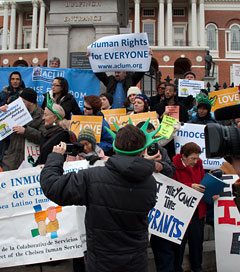As a group of six undocumented youth move through courts for being arrested while protesting the Secure Communities program, and despite repeated attempts by states and localities to opt out coupled with assurances from Immigration and Customs Enforcement (ICE) that this was an option, a recently revealed memo shows that the program will become mandatory in 2013.
This latest revelation may be the final one in a series of confusing announcements by ICE about the controversial information-sharing program, which critics say should be abolished.
“Secure Communities terrorizes our communities and brings fear into people's mind,” said Jorge Mena, 24, an undocumented youth activist. “We did this because we wanted to show where we stand and have undocumented youth have a voice.”
Mena was one of six activists arrested last August when they blocked a street in downtown Chicago during a public hearing on Secure Communities. The youth are part of the Immigrant Justice Youth League and, according to a press release, will be the first undocumented immigrants to go to a criminal trial over immigrant rights protests. Their court date Wednesday was pushed forward to March.
The Secure Communities program was created in 2008 to deport undocumented immigrants with criminal records through fingerprint sharing between local police agencies and the Department of Homeland Security, and states and localities were originally told that they would have the option not to send their fingerprint data to ICE.
Several states, including California, Massachusetts and Illinois, then attempted to opt out of the program, arguing that it deports primarily noncriminals, makes immigrant communities less likely to work with local law enforcement and could lead to racial profiling.
“The program is seriously flawed,” said a Los Angeles Times editorial. “More than half of the 148,841 immigrants removed as of October have either no criminal convictions or minor ones, despite the government's stated goal of targeting serious criminals.”
The program has also entangled Americans – according to The Los Angeles Times, more than 3,000 US citizens have been caught in the program. Most recently, it was revealed that a 15-year-old American citizen was mistakenly deported to Colombia.
In light of the media storm following this case, ICE announced last week that it would open a 24-hour hotline for people who had been wrongly detained, but advocates say this only deals with a small portion of the problem.
“One of the major weaknesses is there is no due process,” Maricela Garcia, director of capacity building at the National Council of La Raza, told ColorLines. “We place in our democracy a lot of value on due process but most don't have access to legal representation because they have to pay for it and the government is not going to provide it.”
Join us in defending the truth before it’s too late
The future of independent journalism is uncertain, and the consequences of losing it are too grave to ignore. To ensure Truthout remains safe, strong, and free, we need to raise $24,000 by the end of today. Every dollar raised goes directly toward the costs of producing news you can trust.
Please give what you can — because by supporting us with a tax-deductible donation, you’re not just preserving a source of news, you’re helping to safeguard what’s left of our democracy.
